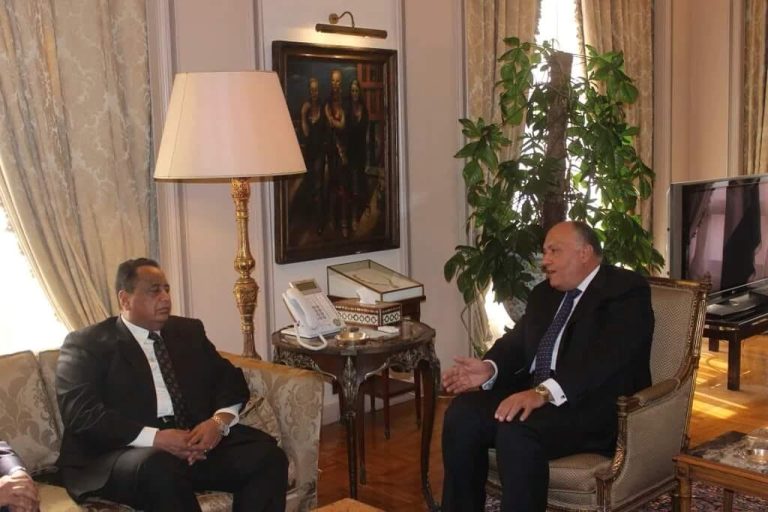Sudanese-Egyptian relations not confined to Dam talks – Sudanese Foreign Minister

CAIRO, Jan 9 (Aswat Masriya) - Egyptian Foreign Minister Sameh Shoukry stated Saturday that Ethiopia is reconsidering Egypt's request to increase the number of gates in the Grand Ethiopian Renaissance Dam.
In a joint press conference with Sudanese Foreign Minister, Shoukry added that the request is a strictly technical issue and should not become a point of contention between the parties, but one of mutual acceptance and understanding, with the aim of arriving at a decision on the request.
Sudanese Foreign Minister Ibrahim al-Ghandour expressed his support for the technical studies that point to the need for increasing the number of gates in the dam, asserting that it is not a political issue.
"The media should keep in mind that Sudanese-Egyptian relations are not confined to talks on the Dam, but they are much bigger than that," said Ghandour.
"Sudan is aware of Egypt's historical right to the Nile River, and its interests will not intervene with Egypt's," he added.
On Wednesday, Egypt's team of technical experts met with their counterpart in the Ethiopian capital to discuss Egypt's request regarding the increase of gates at the bottom of the dam.
Egypt, Sudan and Ethiopia signed an agreement on Dec. 29 regarding the Grand Ethiopian Renaissance Dam, establishing mechanisms for the resolution of conflicting points.
The agreement followed a two-day round of six-way talks between the foreign and water ministers of the three states.
Egypt fears the consequences of the dam on its share of the Nile River water, since it relies on the Nile River as its main source of water. For decades, Egypt has been receiving 55 billion cubic meters of the Nile river's water annually, the largest share, as per colonial-era agreements signed in the absence of Ethiopia, whose Blue Nile tributary supplies most the water. Ethiopia believes it is entitled to using the water for development, by creating electricity using the dam.
The two countries have reiterated multiple times that they will not harm each other's interests, which seem to conflict.
During the press conference, Ghandour also commented on the Halayib and Shaleteen dispute, Ghandour saying that Sudan raises the issue at the Security Council on an annual basis as a protocol measure and affirmed that there is no new complaint against Egypt and both states have agreed to discuss the matter.
The dispute arose between both states regarding the contested region, which is considered by Egypt and Sudan to be part of their territories.
Sudanese President Omar al-Bashir is expected to visit Egypt within the first quarter of 2016 on the sidelines of the meeting of the Joint Higher Committee led by the presidents of both states.
During the press conference, Shoukry alluded to the recent Saudi-Iranian tension, and clarified that the issue will be dealt with in the Arab League's emergency ministerial meeting to be held on Sunday.
Sudan has aligned its position with that of Egypt with respect to the Saudi-Iranian dispute, and both states affirmed their support for the Saudi stance in the matter.
Tensions between Iran and Saudi Arabia escalated following attacks on the headquarters of the Saudi diplomatic missions in Iran by Iranian protesters. A week ago, protestors gathered in fury in response to the Saudi-sanctioned execution of 47 people for terrorism offences, including prominent opposition figure and Shi'te cleric Sheikh Nimr al-Nimr.
Regarding conflicts in Syria and Yemen, Shoukry asserted the need to resolve disputes peacefully and the importance of stablising the situation in both states.









facebook comments